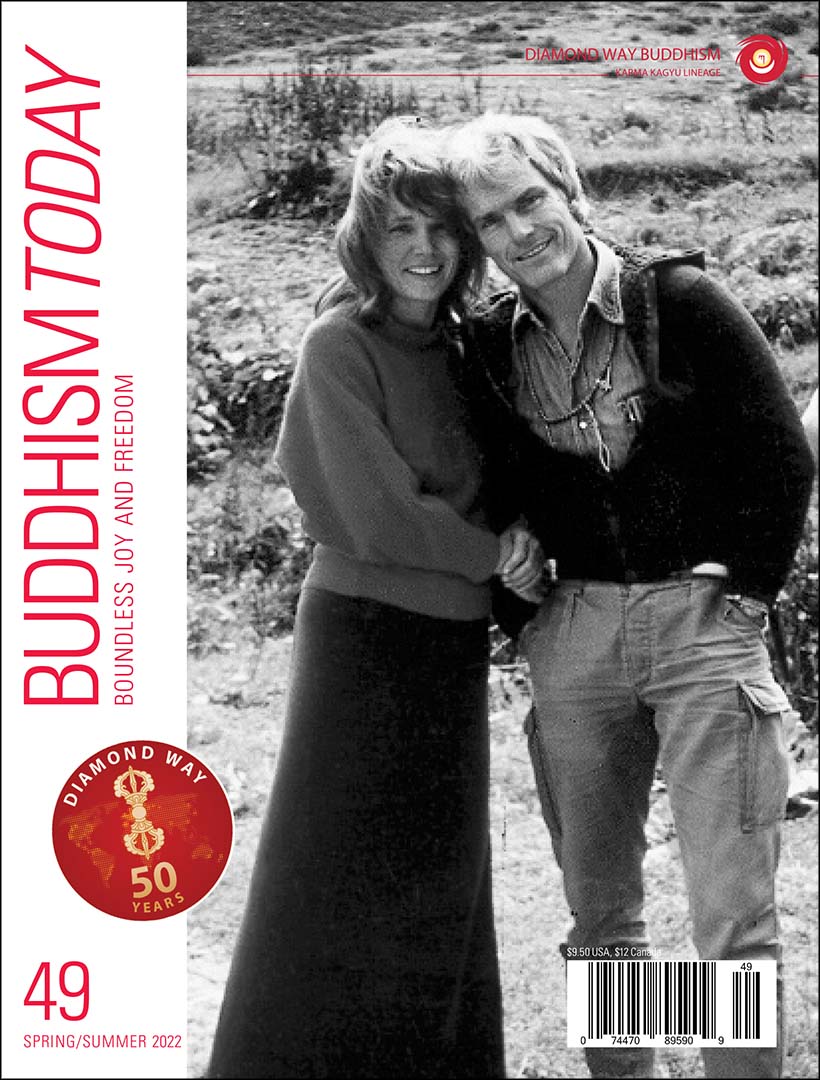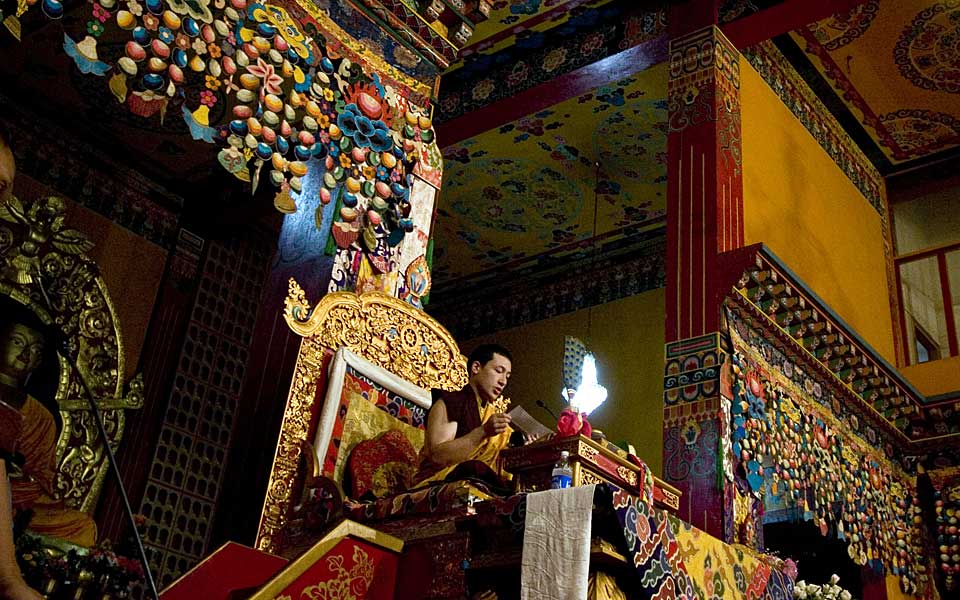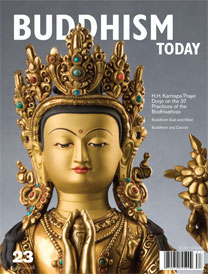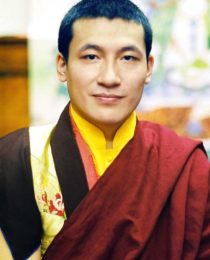The 37 Practices of Bodhisattvas. Part I
These teachings were given in the middle of March 2008 at the Karmapa International Buddhist Institute (KIBI) in New Delhi, India. Following a two-month dharma-course with Professor Sempa Dorje and Khenpo Tsering, H.H. the 17th Karmapa Trinley Thaye Dorje gave teachings and empowerments for one week. The participants were the students from KIBI, two Bhutan pilgrimage groups that combined this visit with their pilgrimage, and many of Karmapa’s students from the West. Responding to a request from the editors of the German magazine Buddhismus Heute for a suitable teaching, Karmapa suggested that these teachings also be published in English in Buddhism Today.
What appears in this issue of Buddhism Today is the first of a three-part series. We look forward to publishing the other two parts in the next two issues of the magazine. Buddhism Today thanks Detlev Göbel, editor of the German Buddhismus Heute, for his help in arranging this text for us.
I decided to teach on this text, The 37 Practices of Bodhisattvas, because we all have chosen our path as Buddhists and to become bodhisattvas. It is quite important to remind ourselves from time to time—and if possible, actually at all times—what it means to be a bodhisattva, what the responsibilities are, and how to carry them out.
Gyelsay Togmay Sangpo, the author of the text The 37 Practices of Bodhisattvas, was born around 1295 in Tibet. He gave many teachings; and this is one of his main and most precious ones, because it is a summary of all the practices that we need to do when trying to become bodhisattvas. The text is called The 37 Practices of Bodhisattvas because there are 37 verses that comprise the main body of the book. All in all there are 43 verses, but the first two are more introductory and the last four include dedications and other things. So there are 37 main verses.
It is a tradition that at the beginning the author pays homage to his wisdom aspect. In this case, the author chose to pay homage to “Loving Eyes,” (Skt. Avalokiteshvara, Tib. Chenrezig). Loki means, in simple terms, “the three worlds”; ishvara means “the conqueror”; and namo means “to pay homage.” So he pays homage and respect to Avalokiteshvara, the “Conqueror of the three worlds.”
With the three doors, I always pay homage to the protector Chenrezig,
The yidam Chenrezig, and the great Guru,
Those who put effort one-pointedly for sentient beings,
Despite seeing all phenomena as neither coming nor going.
He pays homage to his teacher and wisdom aspect because he understands their responsibility and activity. The verse says: “Despite seeing all phenomena as neither coming nor going,” which means that they understand all phenomena of samsara as well as of nirvana—contaminated phenomena as well as non-contaminated phenomena—as not really coming or going. They neither arise nor cease, because their nature is in the absolute truth just as it is.
All sentient beings have strong tendencies of afflicted emotions; and because of that and our continuous karma, we see everything as coming and going, arising and ceasing. It is mainly because of this tendency that we see everything to be appearing in a way that it actually does not. That is the reason for samsara.
Gyelsay Togmay Sangpo pays homage to his guru and yidam, Avalokiteshvara, because they understand our situation very clearly, andcase, they make a one-pointed effort to benefit us, to liberate us.
Perfectly enlightened beings, the source of benefit and happiness,
Result from the practice of supreme dharma
And this depends on knowing the practice.
Therefore I will explain the practices of the bodhisattvas.
In this verse he promises to write the text and describes the main aim of the text, as well as the “aim within the aim” and how these two are connected.
Perfectly enlightened beings, the source of benefit and happiness…
“Benefit” here refers to temporary benefits, both in this life, as well as in future lives, until we reach enlightenment. It refers to having positive circumstances. For instance, right now we have a precious human body, which is something very temporary, because it is impermanent. Nonetheless, the body is a temporary benefit, because we can obtain positive results if we are able to utilize it perfectly and purely.
“Happiness” here refers to permanent happiness. Reaching certain bodhisattva-levels, certain levels of realization, is already something permanent. But reaching enlightenment, the permanent state of happiness, is most important. The enlightened state is the source of both temporary benefits and permanent happiness.
Result from the practice of supreme dharma…
The practice of the supreme dharma is unfailing and profound because, if we practice and utilize it perfectly, the results are guaranteed and inevitable. Dharma includes the path of arhats and the path of the bodhisattvas, and we of course focus particularly on the path of the bodhisattvas.
And this depends on knowing the practice.
In order to reach the enlightened state, we must practice this supreme dharma. For that very reason, Gyelsay Togmay Sangpo explains here how to do this and how to use the path of the bodhisattvas. That is the main content and focus of this text: the practice of the bodhisattvas. The general aim is that through this practice the practitioner will be able to reach enlightenment. The “aim within the aim” is that we do this not just for ourselves, but for the sake of all sentient beings. These two goals are of course related and depend on each other. Therefore, he says:
I will explain the practices of the bodhisattvas.
The practices of the bodhisattvas are closely related to the Bodhisattva Promise. In order to generate this enlightened mind—the bodhicitta—we must first purify or train our mind. “Training the mind” is called lodjong in Tibetan, and the first seven verses of this text address this preliminary mind training. This training comes before we can actually generate bodhicitta.
FIRST VERSE
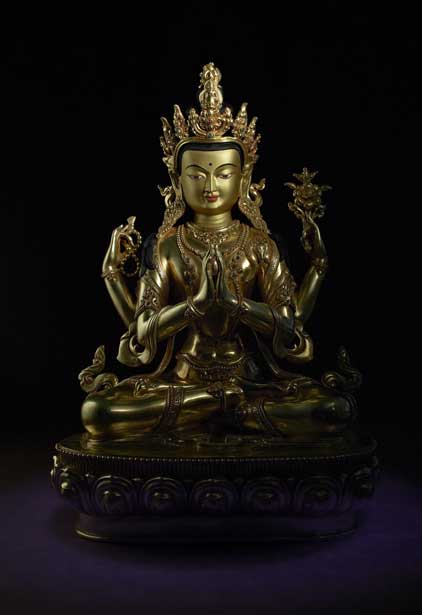 Loving Eyes
Loving Eyes
Since we possess this great vessel of leisure and opportunity, which is difficult to obtain,
Then studying, contemplating, and meditating,
Without negligence through day and night,
In order to bring others and ourselves across the ocean of samsara,
Is the bodhisattva’s practice.
The first mind training is to realize our precious opportunity of having a precious human body. Here it is referred to as a vessel of leisure and opportunity. It means having time and space where all necessary conditions are there.
Leisure means that we have some time for ourselves. Most of the time in samsara we do not get this chance as human beings, because most often we are born into other, more difficult realms of existence. In this case, we are constantly chased by the results of our negative karmas and our afflictive emotions and do not have a single moment to practice dharma. But having obtained a precious human body, our time is like leisure. We have some time to breathe.
Having this leisure means that we are free from eight types of unfavorable rebirths. These include, first, being born in the three low realms: the paranoia realm, the hungry ghost realm, and the realm of animals. If you are born there, you are constantly being bombarded by the results of your negative karma.
Those in the hell realms do not have even one moment to think of dharma, to think of a way to escape. Until the time for their karmic debt is served, they have no time, no leisure, but just have to experience their unfavorable consequences.
It is the same with the hungry ghost realm and the animal realm. The main suffering of the hungry ghost realm is hunger, because of one’s own greed or stinginess—not being able to be generous towards sentient beings.
The unfavorable circumstance for the animal realm is that they lack wisdom. Scientists nowadays call dolphins intelligent animals with high IQ’s and big brains, and for sure they have the capacity for understanding a few things. But if you compare them with human beings, then they really don’t have the precious rebirth. The lack of wisdom is the main obstacle in the animal realm.
The five other unfavorable rebirths are rebirths of human beings in which you are not guaranteed to have the precious circumstances. If your rebirth is in barbaric places, there will be no opportunity to understand dharma because of the cultural background—the mindset of that society, their beliefs and how they hold their morality. It restricts people from understanding dharma as it is.
Another human rebirth that can be unfavorable happens when we are born as a human being but have developed a significantly wrong view. To be a true practitioner, we have to be able to see the truth as it is, in the right way. “Wrong view” means that we understand the truth in a very negative way. We have for example some basic questions about the meaning of life, like: Who are we truly? Why are we truly here? Why do we suffer? From the right point of view, the reason that we are here is: because of karmic activity. The answer to “Who are we?” is very simple: Our true nature is compassion and the state where we are free from any types of afflictive emotions.
But when we have the wrong view, we begin to answer our own questions without thorough analysis. Then we start to believe that we are here because someone created us, or maybe because of a cosmic accident—a big bang. With that we are back to square one, and that is why it is a wrong view. Then it does not matter if you have a human rebirth. You will still go back into the cycle of samsara, and therefore it is another unfavorable circumstance.
There is also the possibility that you attain a human rebirth, but at a time or place where the precious dharma is not present and the teacher who would show us the way to enlightenment does not exist. So if you are born in a time when there is no dharma, that is an unfavorable rebirth. It can also happen that you are mentally handicapped. If we are physically disabled but have a good mind, we still can understand dharma. But if we are mentally disabled, that is not possible.
This is what the verse means by “leisure”: we are free of these eight unfavorable rebirths.
What is meant then by “opportunity”? This has two aspects. The first is called the “opportunity through oneself,” and the other is called the “opportunity through others.”
The opportunities that we have to obtain through ourselves are:
• the rebirth as a human being
• being born in a country or circumstance where dharma is available
• that our mental faculty and the five sense-faculties are intact
• that we have a good connection to dharma. It is possible to be born as a human being, to have all the right circumstances, to function very well and have the faculties to understand dharma; but if we do not have the karmic connection to dharma then we are void of the precious opportunity.
• that we have devotion, trust, and confidence towards the positive things we do in life. If we don’t have that, then again dharma makes no sense.
The five “opportunities through others” are:
• to be born at a time when a buddha has appeared
• to be born at a time when the dharma is taught. There are times when a buddha is present but the collective karma is not ripe for receiving the dharma. Then sometimes the Buddha does not give teachings. We today are very fortunate because, right after Buddha Shakyamuni attained enlightenment, he was asked to turn the wheel of dharma. It is important that individuals want to understand the dharma, because if there isn’t this interest, then Buddha would not teach. In our case we are very fortunate because we have the karma and Buddha has taught the dharma.
• to be born at a time when Buddha’s teachings are still known in our world
• to be born under circumstances when a sangha who practices Buddha’s teachings is available.
• to have the circumstance where Buddha has qualified followers, disciples of the activity of Buddha. That means to have the circumstances where his realized sangha is present.
This last point is important: We could be born as a human being in circumstances where our cultural background is not favorable, where the whole society lacks compassion. Then the cause for giving birth to pure dharma is not possible. Even if the society does not have genuine compassion, it is important that it at least have some compassion.
If we have these ten favorable opportunities, then we can call this human rebirth “precious.”
This “great vessel of leisure and opportunity” is difficult to obtain because of the very force of samsara, i.e., the force of our own afflictive emotions and karma. This automatically leads us to give ourselves over to negative actions, and this results in rebirths in any of those unfavorable circumstances. It is really precious to have obtained this precious human body, whose potential is beyond our imagination. We are able to perform many wonderful things, but most of all we are able to obtain the perfect state of happiness, enlightenment, buddhahood. As long as we have this precious vessel, we are able to benefit ourselves and at the same time countless sentient beings.
It is difficult to obtain because this vessel is a result of karma, and as long as anything is a result of karma, then we are victims of impermanence. Every moment and every second this vessel is coming towards its end. We have no guarantee how long this opportunity will last.
The verse says that we have to try our best to use this precious opportunity. The most profound way to do so is by studying, contemplating, and meditating without negligence, throughout day and night. That means studying all aspects of all phenomena and more importantly, all aspects of our mind, because whatever we learn in our initial stage as a dharma practitioner is mainly about the different states of our mind. Anger, jealousy, attachment and so on are all various aspects of mind. Therefore we need to study in order first of all to identify all of those states, both the negative and the positive aspects. After studying this, we contemplate it with great analysis, because without thorough research we are not able to have the confidence that it really is like this. Without great trust it is hard to actualize it. That is why contemplating it is important.
Finally, meditation is equally important, because that is where we put it all to use. Meditation is where we concentrate and pinpoint our mind into what we want to learn and achieve. We meditate without negligence because we understand how precious our opportunity is. We do not want to waste any time, so we avoid all distractions. We do this day and night, to bring ourselves across the ocean of samsara. Earlier we talked of the precious human body as a vessel, and samsara is appropriately referred to as a great, vast, endless ocean. Therefore we use this vessel and we apply all the necessary skills of sailing, such as studying, contemplating, and meditating. Then we sail across the ocean of samsara towards the land of enlightenment. For a beginner in the practice of the bodhisattvas, understanding and acknowledgement of the precious human body is very important and one of the first mind trainings.
SECOND VERSE
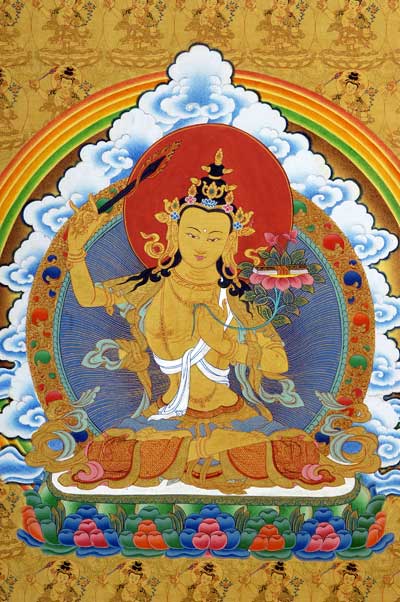 Manjushri
Manjushri
Desire towards relatives is like waves in the water.
Anger towards an enemy burns like fire.
Ignorance is like a darkness that forgets what to keep and what to throw away.
Abandoning one’s homeland is the bodhisattva’s practice.
Abandoning the homeland is related to the first mind training of the precious human body. We are advised not to waste any opportunities or time because we will never be certain when this precious human existence will come to an end. To be able to practice and utilize this precious opportunity, we have to be free of unfavorable circumstances.
Our homeland is a place to which we are very attached. Whenever we face difficult circumstances, we think “I wish I were back home,” because homeland is something of a sanctuary. But if we are too long in it, it gives rise to the three poisons of attachment, anger, and ignorance; and from that moment all of the precious circumstances cease to exist.
That is why abandoning the negative circumstances that give rise to the three poisons is the practice of the bodhisattva.
The verse talks about desire: “Desire is like waves of water.” It also says “desire towards one’s relatives,” but it does not have to be just that. Of course they are included, i.e., that one automatically develops desire for those we are related to, like parents and friends. We feel comfort in that. “Waves of water” means that desire works by its nature like water: It flows very passively, but it dampens the surrounding place it has reached. When our state of mind is dampened by this water-like attachment, it is in a certain sense destroyed.
How do these three negative emotions arise in us? The grounds for desire are the relatives and friends and those who are dear to you. Because of them attachment naturally arises. The grounds for anger are the people that we dislike. Literally it says “enemies,” but it does not have to be real enemies. Anyone that you dislike provides the grounds for anger in us. The grounds for ignorance is our lack of wisdom. These three poisons are symbolized here by water, fire, and darkness.
We still have attachment, anger, and ignorance because of our involvement with these emotions since beginningless time. When we face favorable circumstances, we feel desire towards them. When we come across difficult circumstances, we feel anger and want to avoid them. First we try the peaceful way of negotiation and compromise. But if that does not work, then we use the means of force, and chaos starts.
Our homeland gives rise to these emotions, and naturally in time we forget what is profound and what is to be kept precious in our life and what is to be discarded. So this particular unfavorable circumstance is like a very dark and dim place where we start to lose our grip on what is really important. Abandoning this unfavorable circumstance called “homeland” is the bodhisattva’s practice.
Abandoning the homeland may seem very easy when we just hear the words. But when you have to live a life where you are closely related and linked to society and daily responsibilities, it is not that easy. I can imagine that very clearly. Just because this text says that you need to abandon your homeland, it does not necessarily mean that now we have to abandon our home. It does not mean that right away you have to live like Milarepa—that you just pack your bag and say, “that’s it.” We have to be reasonable. Even the Buddha himself said that this is very important. We do not need to take drastic measures, rather we take measures with great responsibility.
My advice is that you don’t give up everything right away. You continue with the life you are leading, because to be a good Buddhist means that you have to be a good example. Living in a society, you have the opportunity to be an example, a source of inspiration or hope for others. Therefore you do things accordingly. You don’t abandon what you have, but you make sure that your priorities are clear and straight. It means that you make sure that your main responsibility is exactly this, i.e., what we can learn from these precious teachings. Our main aim is to reach enlightenment and to develop our positive qualities. A life of a business-man or -woman has to be continued. It does not make any sense to abandon it without good reason. Even though we may think that we have a good reason to abandon society, society itself may not understand it. And more importantly, for some of us who are at a beginner’s level, instead of transforming that into a positive circumstance, it could turn into a hindrance. I strongly suggest that you continue the life that you are leading in your various professions. And unless it involves going to war or being a butcher, all professions have their beneficial qualities where you can benefit in many ways.
Therefore “abandoning your homeland” does not mean giving up everything right away. You give it up mentally and make sure you don’t indulge into it.
THIRD VERSE
Abandoning negative enviroments gradually reduces defilements.
In the absence of distractions virtuous action naturally increases.
A certainty in the dharma grows from a pure mind.
To be in solitude is the bodhisattva’s practice.
Abandoning negative environments reduces defilements, both physical as well as mental.
In a perfect world, you might be able to avoid everything; and this would be great. But because of our karma and our
responsibilities, it is not that easy. Rather, you make sure to mentally abandon negative environments. Then you may later have the opportunity to abandon them physically as well. What is meant here is actually quite clear from the teachings on the previous verse. “Abandoning homeland” as well as “abandoning unfavorable circumstances” gradually reduces defilements such as afflictive emotions. In the absence of such distractions naturally our positive actions, positive speech, and positive thoughts increase— like a waxing moon.
Then certainty, trust, and devotion in the dharma grow very purely in our mind. Therefore seeking solitude is the bodhisattva’s practice. Seeking solitude in general is physical and mental. But in your case the priority would be to seek solitude mentally, given the very hectic circumstances that you find yourselves in.
FOURTH VERSE
Close friends who have accompanied us for a long time will separate.
Wealth achieved with great effort will be enjoyed by somebody else.
The guest consciousness will leave the guesthouse of the physical body.
Giving up attachment to this life is the bodhisattva’s practice.
This is the fourth mind training: being able to let go of this life. This offers another angle for understanding the impermanence of this life. Our close friends, relatives, and those with whom we have had close connections for a long time will be separated from us. This is very natural, since everything is impermanent. The same goes for the wealth of possessions, houses, lands, money, power or fame, or whatever we have put great effort into. When the time of the impermanence of life comes, there are no ifs or buts. Everything will simply be left behind. An example is given here: our mind-stream is like a guest and our physical form is like a hotel. When the impermanence of life strikes, then we have no option but to leave this physical form. At that time, neither our closest friends and relatives nor our prized possessions will be able to go with us. Therefore, it is a big hindrance to have a lot of attachment to them and to neglect the fact of impermanence. When we give up attachment to this life—another mind training—we are no longer distracted from what we have to do, from our responsibility.
FIFTH VERSE
The three poisons increase in the company of a bad friend.
The activities of studying, contemplating, and meditating will degenerate.
This will result in the loss of love and compassion.
Abandoning bad friends is the bodhisattva’s practice.
A “bad friend” in this context can be anyone. Maybe we think it is somebody coming at us with horns and steam coming out of their ears, but it could be anyone with lack of knowledge of the truth. Anyone who does not uphold the very morality of life, anyone who doesn’t have trust, confidence, or devotion to the dharma can be a “bad friend.” As long as they accompany us on the road of life, the three poisons will naturally increase. At the same time the activities of studying, contemplating, and meditating will naturally degenerate.
This will result in the loss of love and compassion, the very source of happiness, whether in worldly, spiritual, or dharma terms. These are the very basis of happiness and of simply being a good person. So it goes without saying that you must have love and compassion to attain enlightenment. If we trudge along with negative friends, we can be sure that in time we will lose all of those positive qualities and that our habitual patterns will grow. We will lose the very opportunity to reach the perfect state of enlightenment.
SIXTH VERSE
Faults will diminish if you rely on a spiritual friend.
Your knowledge will increase like the waxing moon.
Cherishing your spiritual friend more than your own body
Is the bodhisattva’s practice.
This verse is about finding true spiritual friends and relying on them. To be able to accomplish the previous mind trainings properly and to be sure that they are really understood, it is of utmost importance to rely on a spiritual friend. This verse explains the qualities that you will attain then. The previous verse spoke of “bad friends,” so now spiritual friends could be called the “good friends.”
When we rely on a spiritual friend, our three mindpoisons will naturally decrease and our habitual negative patterns will diminish. If you see them gradually diminish, that is a sign that a particular individual is a spiritual friend. The verse also says that your knowledge will increase like the waxing moon. If you are free from faults and distractions, then your positive qualities and your knowledge about how things really are will increase. Therefore it is the bodhisattva’s practice to cherish spiritual friends more than one’s own body.
First we have to identify the spiritual friends and then cherish them like a precious treasure. The verse talks about cherishing them even more than our own body, because samsaric beings have a strong tendency to think first of their physical form and then of the mind. We make sure that the body survives, and we keep it intact. The importance of a spiritual friend is so great that you should consider the spiritual friend as far more important than your most treasured possession, which is your body.
The author, the Bodhisattva Togmay, explains the six mind trainings in these six verses. They are meant particularly for practitioners on a beginner’s level. It is absolutely necessary to identify and to practice them. Afterwards we can move on to the next level, that of taking refuge. Once we have understood the first mind trainings, then we can take refuge properly. Of course we take refuge every day and we take refuge in very special ceremonies, many times in our life. But it is important to be able to take it properly.
SEVENTH VERSE
How can worldly gods rescue others
When they are themselves imprisoned in samsara?
Therefore taking refuge in the triple gem, which never deceives,
Is the bodhisattva’s practice.
We have to identify those who are an unfailing refuge. The worldly gods of samsara cannot guarantee us a safe passage. They are themselves victims of their own karma and afflictive emotions and are not able to guarantee that we will not end up just like them. Worldly gods could be gods from a particular area or gods created from our own concepts. When we take refuge, we must make sure that we take refuge in someone who can guarantee us an unfailing refuge, a most profound sanctuary. That would be the refuge in the Three Jewels, particularly the Buddha and of course also the dharma and sangha. This is the practice of the bodhisattvas.
I would like now to explain the beyond-worldly refuge a little bit further. It is called the Three Jewels: buddha, dharma and sangha.
There are two aspects of refuge, which can be described as the refuge that is right in front of us and the refuge that we must identify with, i.e., the refuge that we are trying to accomplish. Normally every time we take refuge, we acknowledge that Buddha is our guide or example for how we can achieve enlightenment and a perfect state of everlasting happiness. We understand the dharma as the very path that we must use in order to reach that state. And, depending on our kind of path, our yana, the sangha is the guidance we seek in order to make sure that we are on the right track.
There is the refuge of body, speech, and mind. Identifying the Three Jewels in this way and taking them as our absolute refuge, we understand that the refuge will purify our negativities, afflictive emotions, negative veils, fears, and suffering.
When we whole-heartedly take refuge in the buddha, dharma, and sangha, it is called the “refuge of mind.” The “refuge of speech” happens when we recite the refuge text in whatever language we are used to, with the aforementioned understanding and motivation. The “refuge of body” happens when on the basis of great devotion and respect we prostrate physically towards the Three Jewels in order to give up our pride.
We try to practice the path of the bodhisattvas in order to reach the absolute state of buddhahood. In order to achieve this, we must identify the “absolute refuge”: the state of buddhahood itself. The refuge as a whole—the buddha, dharma, and sangha—is not a refuge that we take out of blind faith or without reason and clear understanding. Rather we take refuge in them through great analysis of the truth. For example, concerning a buddha we must understand that its absolute state—its essence—is actually none other than the three kayas: the dharmakaya, the sambhogakaya, and the nirmanakaya. Buddha is the state of mind in which one has accomplished all of them very clearly. This particular state we are trying to achieve, and that is called the Refuge of Buddha, or the enlightened state.
In the same way, we must recognize that the dharma is both the foundation of absolute enlightenment, which is compassion and loving kindness, and the tools to accomplish all of this, the wisdom and the means.
Lastly, with the refuge of sangha, we are referring particularly to the realized bodhisattvas. We take refuge in them.
We take refuge when we have done the six mind trainings explained above, because then we feel that we must find a way to renounce the grasping to samsara. From out of that we seek refuge in the Three Jewels.
This text is the result of teachings given in English by Gyalwa Karmapa, transcribed by Rachelle and Jim Macur, edited by Kenn Maly and Detlev Göbel; finally, at the request of Gyalwa Karmapa, it was proof-read and corrected by Khenpo Ngedoen.
